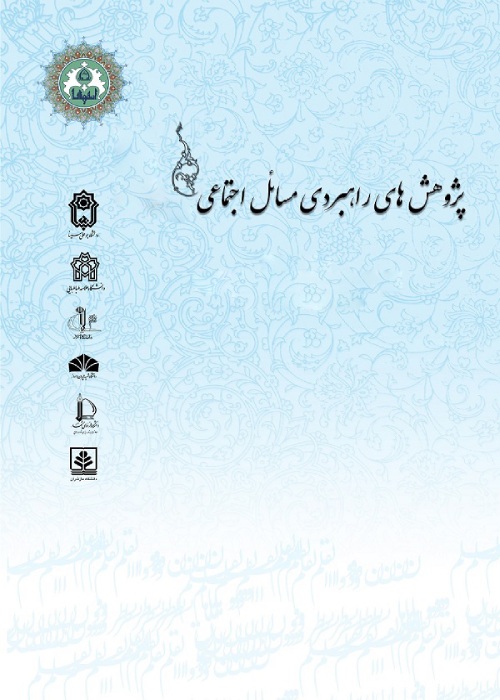A Study of Social Apathy among Students (The Case of the University of Isfahan)
Author(s):
Abstract:
Introduction
Social apathy is one of the most unpleasant elements of the modern culture which is defined by an overemphasis on personal preferences and individualistic interests in contemporary urban life and imposes itself as an obstacle in the process of creation and provision of positive social relationships. It also decrease citizen's participation in social affairs, leading to weakness or even blockage of national development. Also, it is considered as absence or suppression of passion, emotion, or excitement. It is therefore creates a negative connotation by which not only is one absent of their own life's situations, but they care even less about the situations of others - even if they can do something about it. Social apathy is a desensitization of humane involvement where society is concerned. Sociologists name factors such as the growth of industry and technology, development of social relationships, rapid growth of the population, fast movements of the population, development of urban culture, closeness of different cultures and subcultures, rationalization of human behavior, the rigid logic f calculation, individualism, weakness of religious institutions and believes, secularism, and destruction of collective and local identities as factors contributing to the increase of this problem and believe that contemporary societies experience a period of crisis in human relations. In their view, in the same way that wide citizen's participation in various spheres of social life is an important perquisite for social, economic, and political development, so is their lack of participation an important factor in staying undeveloped and stagnated. The promise of sociology is to study and explore social problems and issues, providing therefore solutions to get rid of them. Hence in this paper we intend to study social apathy in Isfahan city as the second largest metropolitan city in Iran and among university students, whose participation and responsibility is important in the process of social, sustainable development. Thus the key question is how this variable is rated among university students and what important factors may influence it? Material And Methods
This is a quantitative study based on a survey of measuring the amount of social apathy among university students in Isfahan in the year 2013. It also examines the relationship between social apathy as a dependent variable with such independent variables as social capital, cost and benefit analysis, social responsibility, and background characteristics. Sample size includes 372 individuals, who were selected by means of multi-stage random sampling method, on the basis of such characteristics as field of study, age and gender and using Cochran formula. The collected data was analyzed using SPSS. The research instrument is a researcher-made questionnaire, designed by a combination of different questions on a 5-level Likert scale. In order to obtain face validity, feedback from experts were used and for reliability, Cronbach's Alpha coefficient was tested, which was above the minimum acceptable level (0.7) for all sub-scales.Discussion of Results and Conclusions
The results of the study indicate that the rate of social apathy is not high among students. This finding, however, does not mean that we can easily forget about apathy and do not think of various ways to increase social capital and trust. After testing research hypotheses, it became apparent that the relationship between social capital and social apathy is significantly reverse (r= -0.34), meaning that the more social capital, the less social apathy. Likewise, social responsibility appears to be in a reverse and meaningful relationship with social apathy. In conclusion, it should be emphasized that in every society where people feel socially committed, it is less likely that we come across such undesirable social problems as apathy, because people feel about each other and are not too much selfish. Policy makers and social scientists alike should be more sensitive to these issues and think of ways to increase people's sense of belonging to, and participation in society's affairs.Keywords:
Language:
Persian
Published:
Strategic Research on Social Problems in Iran, Volume:4 Issue: 1, 2015
Pages:
59 to 78
https://magiran.com/p1371652
دانلود و مطالعه متن این مقاله با یکی از روشهای زیر امکان پذیر است:
اشتراک شخصی
با عضویت و پرداخت آنلاین حق اشتراک یکساله به مبلغ 1,390,000ريال میتوانید 70 عنوان مطلب دانلود کنید!
اشتراک سازمانی
به کتابخانه دانشگاه یا محل کار خود پیشنهاد کنید تا اشتراک سازمانی این پایگاه را برای دسترسی نامحدود همه کاربران به متن مطالب تهیه نمایند!
توجه!
- حق عضویت دریافتی صرف حمایت از نشریات عضو و نگهداری، تکمیل و توسعه مگیران میشود.
- پرداخت حق اشتراک و دانلود مقالات اجازه بازنشر آن در سایر رسانههای چاپی و دیجیتال را به کاربر نمیدهد.
In order to view content subscription is required
Personal subscription
Subscribe magiran.com for 70 € euros via PayPal and download 70 articles during a year.
Organization subscription
Please contact us to subscribe your university or library for unlimited access!


